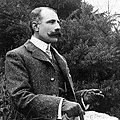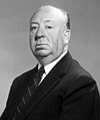The England portal

| |
England is a country that is part of the United Kingdom. It is located on the island of Great Britain, of which it covers about 62%, and more than 100 smaller adjacent islands. It has land borders with Scotland to the north and Wales to the west, and is otherwise surrounded by the North Sea to the east, the English Channel to the south, the Celtic Sea to the south-west, and the Irish Sea to the west. Continental Europe lies to the south-east, and Ireland to the west. At the 2021 census, the population was 56,490,048. London is both the largest city and the capital.
The area now called England was first inhabited by modern humans during the Upper Paleolithic. It takes its name from the Angles, a Germanic tribe who settled during the 5th and 6th centuries. England became a unified state in the 10th century and has had extensive cultural and legal impact on the wider world since the Age of Discovery, which began during the 15th century. The Kingdom of England, which included Wales after 1535, ceased to be a separate sovereign state on 1 May 1707, when the Acts of Union brought into effect a political union with the Kingdom of Scotland that created the Kingdom of Great Britain.
England is the origin of the English language, the English legal system (which served as the basis for the common law systems of many other countries), association football, and the Anglican branch of Christianity; its parliamentary system of government has been widely adopted by other nations. The Industrial Revolution began in 18th-century England, transforming its society into the world's first industrialised nation. England is home to the two oldest universities in the English-speaking world: the University of Oxford, founded in 1096, and the University of Cambridge, founded in 1209. Both universities are ranked among the most prestigious in the world.
England's terrain chiefly consists of low hills and plains, especially in the centre and south. Upland and mountainous terrain is mostly found in the north and west, including Dartmoor, the Lake District, the Pennines, and the Shropshire Hills. The country's capital is London, the metropolitan area of which has a population of 14.2 million as of 2021, representing the United Kingdom's largest metropolitan area. England's population of 56.3 million comprises 84% of the population of the United Kingdom, largely concentrated around London, the South East, and conurbations in the Midlands, the North West, the North East, and Yorkshire, which each developed as major industrial regions during the 19th century. (Full article...)
Sir James Paul McCartney CH MBE (born 18 June 1942) is an English singer, songwriter and musician who gained worldwide fame with the Beatles, for whom he played bass guitar and the piano, and shared primary songwriting and lead vocal duties with John Lennon. One of the most successful composers and performers of all time, McCartney is known for his melodic approach to bass-playing, versatile and wide tenor vocal range, and musical eclecticism, exploring genres ranging from pre–rock and roll pop to classical, ballads, and electronica. His songwriting partnership with Lennon is the most successful in modern music history.
Born in Liverpool, McCartney taught himself piano, guitar, and songwriting as a teenager, having been influenced by his father, a jazz player, and rock and roll performers such as Little Richard and Buddy Holly. He began his career when he joined Lennon's skiffle group, the Quarrymen, in 1957, which evolved into the Beatles in 1960. Sometimes called "the cute Beatle", McCartney later immersed himself in the London avant-garde scene and played a key role in incorporating experimental aesthetics into the Beatles' studio productions. Starting with the 1967 album Sgt. Pepper's Lonely Hearts Club Band, he gradually became the band's de facto leader, providing creative impetus for most of their music and film projects. Many of his Beatles songs, including "And I Love Her", "Yesterday", "Eleanor Rigby", and "Blackbird", rank among the most covered songs in history. Although primarily a bassist with the Beatles, he played a number of other instruments, including keyboards, guitars, and drums, on various songs. (Full article...)
Selected article -
Hastings (/ˈheɪstɪŋz/ HAY-stingz) is a seaside town and borough in East Sussex on the south coast of England, 24 mi (39 km) east of Lewes and 53 mi (85 km) south east of London. The town gives its name to the Battle of Hastings, which took place 8 mi (13 km) to the north-west at Senlac Hill in 1066. It later became one of the medieval Cinque Ports. In the 19th century, it was a popular seaside resort, as the railway allowed tourists and visitors to reach the town. Today, Hastings, is a popular seaside resort and is still a fishing port with the UK's largest beach-based fishing fleet. Its estimated population was 91,100 in 2021. (Full article...)
General images
Alan Mathison Turing OBE FRS (/ˈtjʊərɪŋ/; 23 June 1912 – 7 June 1954) was an English mathematician, computer scientist, logician, cryptanalyst, philosopher and theoretical biologist. He was highly influential in the development of theoretical computer science, providing a formalisation of the concepts of algorithm and computation with the Turing machine, which can be considered a model of a general-purpose computer. Turing is widely considered to be the father of theoretical computer science.
Born in London, Turing was raised in southern England. He graduated from King's College, Cambridge, and in 1938, earned a doctorate degree from Princeton University. During World War II, Turing worked for the Government Code and Cypher School at Bletchley Park, Britain's codebreaking centre that produced Ultra intelligence. He led Hut 8, the section responsible for German naval cryptanalysis. Turing devised techniques for speeding the breaking of German ciphers, including improvements to the pre-war Polish bomba method, an electromechanical machine that could find settings for the Enigma machine. He played a crucial role in cracking intercepted messages that enabled the Allies to defeat the Axis powers in many crucial engagements, including the Battle of the Atlantic. (Full article...)
Did you know?

- ... that the 1643 Westminster Assembly, which was appointed by the Parliament of England to restructure the Church of England, produced the Westminster Confession, the foundation of the Presbyterian Church?
- ... that Declaration of Sports was a 1617 declaration of James I of England listing archery and dancing as permissible on Sundays and that Puritans in Parliament had it publicly burned in 1643?
- ... that Jemmy Button was a Yaghan from Tierra del Fuego who was bought for a mother-of-pearl button in 1830 and taken on HMS Beagle to meet the King and Queen of England?
In the news

- 20 November 2024 – 2024 United Kingdom farmers' protests
- Deputy Prime Minister Angela Rayner dismisses concerns brought on by protests in London from United Kingdom farmers against new agricultural inheritance taxation policies as "scaremongering". (Sky News)
- 19 November 2024 – 2024 United Kingdom farmers' protests
- Thousands of British farmers protest at the Houses of Parliament in London, United Kingdom, against a new inheritance tax on land ownership that includes farms. (Al Jazeera) (BBC News)
- 6 November 2024 – Protests against Donald Trump
- Just Stop Oil protesters spray orange paint on the outside of the American Embassy in London, United Kingdom, following Donald Trump's re-election in the 2024 U.S. presidential election. (The Independent)
- 24 October 2024 – Regulation of electronic cigarettes, Smoking bans in the United Kingdom
- The British government announces that single-use vapes will be banned in England and Wales beginning on 1 June 2025. (BBC News)
- 23 October 2024 –
- Three people are found deceased and seven are hospitalized due to carbon monoxide poisoning at a care home in Swanage, Dorset, England. (Sky News)
Selected featured content
Categories
Selected quotes
| “ | Do not be misled by memories of your youth when, on the Continent, wanting to describe someone as exceptionally dull, you remarked: 'He is the type who would discuss the weather with you.' In England this is an ever-interesting, even thrilling topic, and you must be good at discussing the weather. | ” |
Related WikiProjects
England • Bedfordshire • Brighton • Cheshire • Cornwall • Derbyshire • Dorset • Greater Manchester • Hampshire • Lincolnshire • London • Merseyside • Northamptonshire • North East England • Sheffield • Surrey. Warwickshire • West Midlands • Worcestershire • Yorkshire
Topics
Things you can do

- Please visit the English Wikipedians' notice board and help to write new England-related articles, and expand and improve existing ones.
- Visit Wikipedia:WikiProject England/Assessment, and help out by assessing unrated English articles.
- Add the Project Banner to English articles around Wikipedia.
- Check for announcements and open tasks for ways to improve English related articles.
- Help nominate and select new content for the England portal.
- Requested articles: Charterhouse Lane • Renewable energy in England • Ealing Village
- Expand: Dorothy Boyd • David Troughton
Related Portals
 |
 |
 |
 |
 |
 |
 |
 |
| East Midlands | London | North East | North West | South East | South West | West Midlands | Yorkshire and the Humber |

|

|

|

|

|
| Ireland | Northern Ireland | Scotland | United Kingdom | Wales |
Associated Wikimedia
The following Wikimedia Foundation sister projects provide more on this subject:
-
Commons
Free media repository -
Wikibooks
Free textbooks and manuals -
Wikidata
Free knowledge base -
Wikinews
Free-content news -
Wikiquote
Collection of quotations -
Wikisource
Free-content library -
Wikiversity
Free learning tools -
Wikivoyage
Free travel guide -
Wiktionary
Dictionary and thesaurus















































































![Image 78The Staffordshire Hoard is the largest hoard of Anglo-Saxon gold and silver metalwork yet found[update]. It consists of almost 4,600 items and metal fragments. (from Culture of England)](http://upload.wikimedia.org/wikipedia/commons/thumb/6/60/Staffordshire_hoard_annotated.jpg/120px-Staffordshire_hoard_annotated.jpg)






















